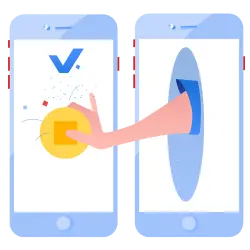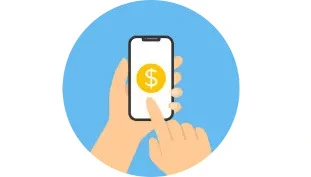Cash App is one of the most prominent payment platforms due to its intuitive user interface and instant transfers. But is Cash App safe? Like many business owners, you might hesitate to leverage Cash for Business (Cash App’s business account feature) in your sales funnel due to security concerns. Given the proliferation of scam artists on payment platforms, you should ensure Cash for Business will be reliable for your customers, vendors, and partners.
To avoid financial fraud or identity theft, here’s a comprehensive outline of Cash for Business user protection measures to consider before integrating the platform into your business.
How Safe is Receiving Money via Cash for Business?

While Cash for Business may attract many bad actors, the platform’s security features are robust. Cash App encryption protocols hide your business’s financial details as they are sent to the platform’s servers. This helps mitigate the threat hackers pose to your account, and two-factor authentication (2FA) also adds another layer of protection to prevent unauthorized access.
Cash App complies with Level 1 of the PCI Data Security Standard (PCI-DSS), the highest benchmark available. Thus, the technical safety measures are strong enough to prevent most direct attempts to steal from your business.
However, scam artists still operate on the platform by using various forms of social engineering to circumnavigate your defenses. Cash App fraud prevention measures attempt to combat these scams by asking you to confirm payments before sending funds to a new party. Additionally, you’ll be notified if your PIN password changes and asked security questions if you send money internationally or log in from a new device.
How Cash App Handles Your Privacy and Personal Information
Cash for Business asks users to provide identifying information, such as a Social Security Number, full name, and date of birth, to verify accounts and prevent money laundering. These details stay on Cash App’s servers, protected through encryption and administrative safeguards.
While Cash App privacy measures are relatively strong, a breach is always possible. This potential applies to every payment platform, and it’s a trade-off for such a convenient business tool.
The app may also share some of your data with other users during transactions and with Cash App servicers, affiliates, and group companies. So, while storing data anywhere comes with an inherent risk, Cash App has favorable data privacy measures compared to many other payment platforms.
Strategies to Make Your Cash for Business Experience Safer
Social engineering is one tactic scammers use to steal from your Cash for Business account. You can improve the security of your account by following a few best practices for avoiding scams when interacting with the app.
In Cash for Business’s account settings, you can turn on your security lock to ensure that every outgoing payment requires a passcode, face ID, or touch ID. You can enable notifications on your phone or email whenever a payment is initiated in your settings. Also, you can add 2FA to the email account tied to your Cash for Business profile.
Finally, be on the lookout for potential scams from anyone posing as Cash App’s support personnel. An actual Cash App employee will never ask you to send funds, provide a sign-in code, or download another application. Avoid any interactions with any unknown party that requests these actions from you.
Navigating Apprehensions in Cash for Business
Despite the notable scams that proliferate Cash App, the platform is relatively safe for businesses. The combined security features and privacy measures offer users high account safety so long as they don’t give out sensitive information.
User behavior is the most prominent safety concern associated with the payment platform. You can confidently navigate and conduct your operations securely on Cash for Business by exercising caution when handling suspicious transaction requests or avoiding phishing scams.
Resolutions for When Security Issues Happen

As mentioned above, one of the most common scams on Cash for Business involves pretending to be support personnel to obtain funds or information. Given the ubiquity of these scams, how can you trust that any support from Cash App is safe?
Luckily, there’s a trustworthy option to chat with support personnel directly through the app. Use the Cash for Business in-app support feature whenever possible to ensure security. You can also reach official support personnel through Cash App’s official phone line or verified social media accounts.
Concerning disputes, Cash for Business has a straightforward chargeback process where users can report questionable transactions directly within the app. The service then investigates with involved parties and financial institutions to resolve the issue. If Cash App decides to resolve the dispute in your favor, the missing funds will be returned.
Comparing Cash App Security Functionalities Against Other Apps
Cash App’s security features are similar to those of competitors like Venmo, PayPal, and Zelle. However, some key distinctions emerge compared to its alternatives.
- Venmo: Much like Cash for Business, Venmo uses encryption and 2FA to protect users. The two platforms operate similarly, with the main distinctions in fees and account limits. As an added note, Cash App can also integrate with POS systems, while Venmo, which is still more P2P-oriented in its interface, cannot.
- PayPal: With extensive buyer and seller protection, PayPal is a preferred option for many businesses. The functionalities are similar to Cash App’s; however, PayPal also operates internationally, offers higher transaction limits, and provides more complex accounting tools. Meanwhile, Cash App tends to process transactions more quickly.
- Zelle: Zelle’s primary advantage is its integration with the existing banking infrastructure. This makes it a highly secure transaction platform. However, it lacks some additional features Cash for Business provides, like investing options, robust chargeback protection, and an account-linked business debit card.
Cash App’s Security in a Nutshell
To put it succinctly, Cash for Business is pretty safe for your business. However, given the proliferation of social engineering scams, any platform poses some risk unless you always remain vigilant.
When choosing between any of these reputable payment platforms, it’s essential to acknowledge that there might be compromises in security and functionality—and if you’re flagged as high-risk, you may be locked out of these “solutions” entirely.
At PaymentCloud, we don’t believe that you should have to bend your business to suit limitations. All of our solutions come with robust security measures and easy-to-reach customer support. You’ll never be left alone, so you can focus on running your business knowing that your payment processing is covered. We accommodate all business models—regardless of your risk classification, we’re ready to help you find a solution that works for you.
Cash App Safety FAQs
Is Cash App Secure for Your Finances?
Thanks to its robust set of protective features, Cash App is a relatively secure platform for sending and receiving funds. However, you should note that your Cash App accounts do not have FDIC insurance, meaning funds are at risk of being irretrievable should they be stolen.
The Federal Deposit Insurance Corporation (FDIC) insures deposits at banks and savings institutions, protecting against the loss of deposit accounts (like checking and savings accounts) in the event of a bank failure.
You shouldn’t leave a balance in your account for an extended time. Instead, move the funds to your linked business bank account where they will be insured by the FDIC up to $250,000 per depositor, per bank, for each account ownership category in case of a bank failure.
Is Cash App Navigating the Banking Regulatory Waters With Ease?
Navigating stringent regulatory financial measures is challenging for any payment platform. However, Cash App is compliant with most regulatory measures.
Cash App maintains compliance with various financial regulatory frameworks, including Financial Crimes Enforcement Network (FinCEN) regulations, Anti-Money Laundering (AML) laws, and Know Your Customer (KYC) requirements.
As with any payment platform, user protection against fraud presents an ongoing challenge for Cash App. However, the platform implements strong security features that help to prevent fraud to the best of its ability.
Which Is Safer, a Personal or Business Cash App Account?
The same security measures protect both business and personal accounts on Cash App, making them objectively equal regarding technical safety. That said, there are some key differences between the two account options:
Personal accounts are designed for individual use. They are ideal for sending money to friends and family or for personal transactions. As far as security features, personal accounts leverage encryption, fraud protection, and two-factor authentication. However, they cannot legally be used to facilitate business transactions.
On the other hand, business accounts—under the moniker “Cash for Business”—are meant for merchants conducting professional transactions. Because of this, they come with additional features like issuing refunds and accepting payments with a unique $Cashtag. As these accounts handle potentially larger and more frequent transactions, they have different limits set on them. However, personal accounts are subject to the same encryption and security measures.
Is It Safe to Display My Cash App Name Online?
Experts generally consider it safe to share your Cash App name publicly.
If you don’t want your real name on display, you can set your display name on Cash App to something other than your legal name. This way, only your chosen name, $Cashtag, profile photo, and signup month and year are visible to other people on the platform.
You can name your profile after your business to make your payment portal easier for potential customers to find.
All of the other, more sensitive information you provide Cash App with is protected behind a layer of encryption. In this way, the platform maintains a high degree of privacy for its users. While you should be cautious to share any other personal or financial information when using the app, the public information on your profile is generally safe to share with the world.





